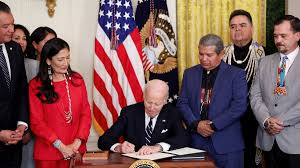Former President Joe Biden's final days in office have come under scrutiny following a report claiming that his chief of staff authorized multiple high-profile preemptive pardons using an autopen. This revelation has sparked a heated debate around the legitimacy of these pardons, with former President Donald Trump voicing strong objections to the use of this device. The controversy has raised questions about transparency, accountability, and the decision-making process within the Biden administration, as well as broader concerns about the handling of executive powers.
The autopen issue emerged as a focal point of discussion when it was revealed that Biden's chief of staff, Jeff Zients, gave final approval for the use of the autopen for the pardons of individuals like Dr. Anthony Fauci and Gen. Mark Milley. This revelation has fueled accusations from Trump and Republicans that Biden may not have been fully aware of the documents he was signing, casting doubt on the legitimacy of the pardons granted during his final days in office. Trump has even gone as far as calling the alleged use of the autopen one of the biggest scandals in recent memory.
The New York Times report shed light on the process behind Biden's pardons, indicating that Biden did not personally approve each individual name and instead signed off on broad categories and criteria for clemency decisions. While Biden has defended his use of the autopen as legal and cited precedents of previous presidents using similar devices, critics have raised concerns about the lack of direct oversight and scrutiny in the decision-making process.
The controversy surrounding Biden's autopen use has reignited tensions between the two political camps, with Trump and Republicans questioning Biden's cognitive abilities and accusing the administration of engaging in a cover-up. Biden and his team have dismissed these allegations as baseless and politically motivated attacks, emphasizing that the pardons were made in line with established legal procedures and guidelines.
The broader implications of this controversy extend beyond the specific pardons issued by Biden, raising fundamental questions about the role of technology in governing processes and the accountability of elected officials. The use of autopen devices in signing official documents has been a longstanding practice, but the current case has triggered a fresh debate about the need for greater transparency and oversight in the exercise of executive powers.
As the controversy unfolds, it underscores the challenges and complexities of modern governance, where issues of technology, legality, and political accountability intersect. The ongoing investigations and debates surrounding Biden's autopen use highlight the importance of upholding the principles of transparency, integrity, and responsible decision-making in public office.
Overall, the autopen controversy surrounding Biden's pardons serves as a reminder of the delicate balance between executive authority and public trust in a democratic society. It underscores the critical need for robust checks and balances to ensure the integrity of decision-making processes and uphold the principles of good governance. As the debate continues to unfold, it will be crucial to address these broader issues and reaffirm the values of accountability and transparency in our political institutions.

